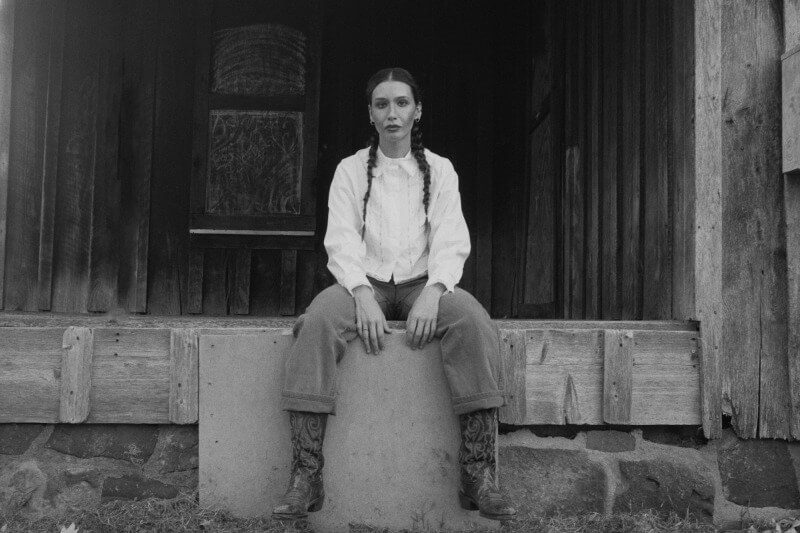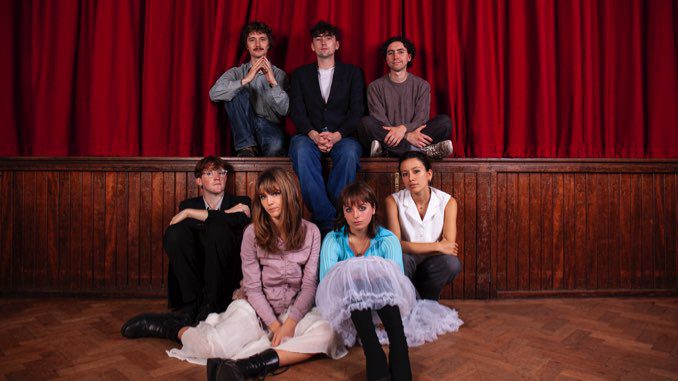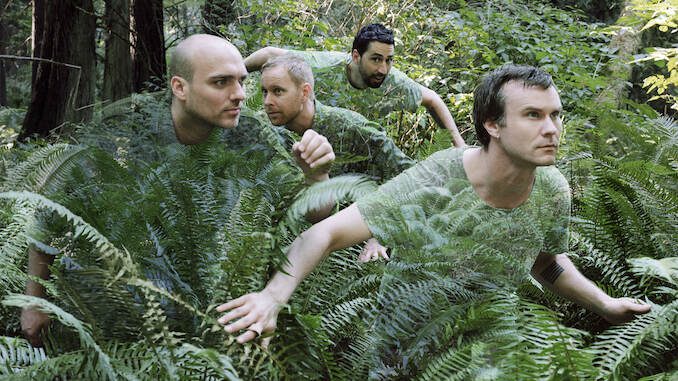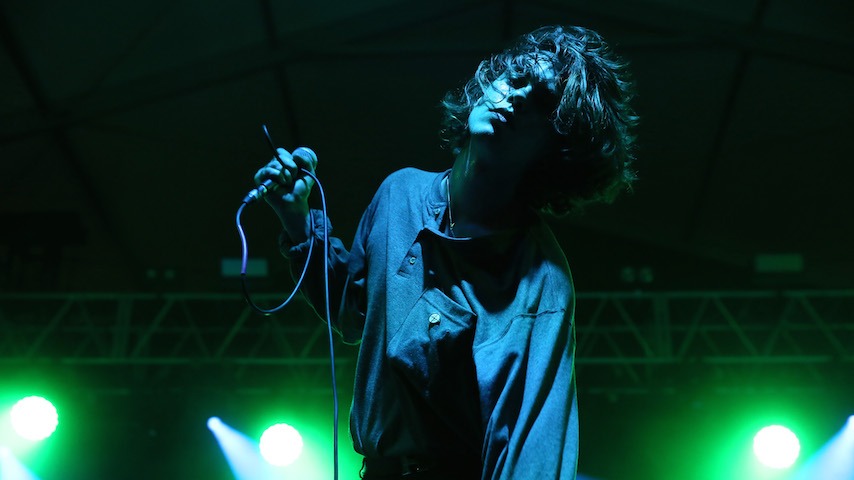Ken Pomeroy is good people. She also made one of this year’s best country records. I met the 22-year-old songwriter first in March, backstage at the Paste event in Austin Texas, after she sang a few at high noon, when the sun lapped at our backs while her voice grew louder than the nearby cars. I snapped a picture of her while the next band set up their gear. The film never developed right but her new album, Cruel Joke, showed up in my inbox a day or two later. I sat down with it in April, and one line got to me quick: “You’re talking too loud, they can hear you way up in the sky.” That’s when I knew it: Ken Pomeroy is a storyteller who’ll break your heart—her soprano voice can devastate every bit of you and cut up a rug all the same.
Pomeroy grew up in the red dirt of Moore, Oklahoma, where her mamaw named her ᎤᏍᏗ ᏀᏯ ᏓᎶᏂᎨ ᎤᏍᏗᎦ, which means “little wolf with yellow hair” in Cherokee. “It wasn’t really ever cool to be Native,” she admits. “And a lot of my family members were not interested in learning about anything. But I was really interested in wanting to grow up in the culture, and my mamaw always made sure that I knew everything.” Mamaw taught Pomeroy everything she knew, regaling stories about growing up in Cherokee traditions and carrying them on within her. She didn’t have a Cherokee name of her own, because her mother passed away unexpectedly and left 16 children behind, all of whom a 7-year-old Mamaw had to take care of. Because of her great-grandmother’s death, Mamaw never got a Cherokee name of her own. It makes Pomeroy’s “little wolf with yellow hair” name all the more precious and sacred.
“For some reason, I latched onto her and wanted to know more about where we came from and who I am and who we are,” Pomeroy says. “A lot of elders don’t want to revisit that part of their life, because it was not a good time at all to be any type of minority. I’m thankful that Mamaw was willing to share that.” And at 96, Mamaw is still smart as a whip, quilting and beading and gabbing on the telephone. And the song Pomeroy wrote for her, “Coyote,” has nearly 700,000 streams now. “I asked her around Christmas, ‘How many people do you think heard that song I wrote about you?’” Pomeroy remembers. “And she goes, ‘250.’ I said, ‘Close, but a little bit more.’ She was very excited.”
Through her dad and stepmom, Pomeroy’s introduction to music was hearing John Denver’s “Leaving On a Jet Plane” at age six, which ignited her interest in writing “little kid poetry.” Soon enough she was front-and-center at her first concert, watching the Dirty River Boys, a pack of El Paso cats kicking up a fuss. Pomeroy can’t remember the name of the band they were opening for, but the Dirty River Boys’ hustle imprinted on her early. It didn’t matter who they opened for. “Being the opening band most of the time, it’s either great or it’s awful,” she says. “People normally don’t care about the opening band, but I grew up only knowing the Dirty River Boys, who were always an opening band.” She came home from the show wanting to be a musician, writing a ditty titled “When I Was Young” on the baritone ukulele at age nine.
Pomeroy’s main interest was country stuff, but she remembers not only her stepmom exposing her to hair metal and yacht rock, but her dad’s enjoyment of rap being something she could latch onto in the “country boondock vibe” of her Sooner upbringing. But the singer-songwriter types prevailed, and by middle school she was a whiz at the guitar. Her dad was especially keen on capturing all the songs she was writing. “We did a little at-home mixtape situation,” Pomeroy remembers. “Then I did my first real ‘studio record’ when I was 14, which no one can find now… hopefully.” In her teens she was in and out of studios—DIY, classy, or otherwise. She was recording on cassette tapes and honing a lo-fi Americana sound until she made Christmas Lights in April at age 18 with minimal instrumentation and minimal production in Arkansas.
[embedded content]
By 2023, Pomeroy was playing in bands all over Oklahoma City, even taking a brief gig strumming her guitar in a bluegrass band despite the urge to go out and do something on her own. “I felt a little lost with what was going on, and I didn’t really want to be just playing in other people’s bands,” she admits. “And I didn’t love the music that I was playing. It was all just a bad time.” Pomeroy and her partner Dakota McDaniel, who was also in and out of a bunch of local bands, quickly found themselves at a crossroads. “We were not enjoying what we were doing, and I remember him being like, ‘What if we just made a record?’” she recalls. “At that point, it was obvious, but not super obvious. I had all this material that hadn’t been recorded, and there was a full-length record sitting there that was staring us in the face.”
Pomeroy and McDaniel went to Tulsa to record in some dude’s home studio, got 60-percent of the way through Cruel Joke, had “little tumultuous run-ins” with the aforementioned dude, and fled to Nashville to finish the damn thing with Rounder Records’ Gary Paczosa. “It was a very, very long, drawn-out process that did not need to be that, but I wouldn’t take it back.” After trying to quit writing and playing music so many times and failing, Pomeroy realized she didn’t have a choice: making music was the vocation she was meant to chase after. “I wanted to finish college and do all the stuff, but I would still write and I would still have to get things out,” she elaborates. “That was just my outlet that was chosen for me. I would still write if I wasn’t doing it for a living, so I figured I might as well just go full force and put everything I have into it.”
She and McDaniel rarely worked on music together before Cruel Joke. They’d been together for a year by that point, but it was “completely separate from music,” she says. “I think that made it even more special, because musicians will meet, work together, and then date. I’m thankful for how we got to know each other as people, and then understood that we were on the same page making music.” The call-and-response echo at the end of “Cicadas” was a complete accident, but it changed everything for the couple. They weren’t just making a few songs in Tulsa with a nobody anymore. “That was the first time where we both said, ‘Maybe we should continue doing this.’”
Pomeroy wrote “Grey Skies” about ten years ago, recording it first for Christmas Lights in April and then again for Cruel Joke. It being such a permanent part of her catalogue wasn’t on purpose, though. “Somehow, the song has just continued and been there the whole time. I had recorded it for Christmas Lights, but then I wanted to do a full band version of it. I wanted to do a really produced version of it. And I did, and that never saw the light of day, because it was terrible. It was not at all what I was trying to get across.” That was her first experience with a group of musicians who did not get her vision. “I would be completely content with releasing a record that’s just me and a guitar. People are able to imprint a lot more if I allow that space and if they push a little bit. So finding people that work well together, like my partner Dakota immediately got the vision, and we work together to figure out what the song needs without any ego attached to it, without trying to make it something cool.”
She never edits her songs to fit any of her band’s arrangements. Actually, it’s the opposite—studio time is spent making the arrangements fit her songs. “I think that’s where a lot of times I was having issues,” she admits. “People would say, ‘Well, what if you change this to make this sound better in the arrangement?’ And I would be like, ‘Well, that’s not the song, right?’” It’s a give-and-take like that that makes finding your people so rewarding. Musicians aren’t meant to always be harmonious with one another. On Cruel Joke, it’s clear that Pomeroy is locked into her bandmates, as they breathe new life into “Flannel Cowboy,” another Christmas Lights in April track. “This is the first stepping stone to more things that we align with in the future.”
In September 2023, Pomeroy’s music got a huge boost, thanks to Sterlin Harjo using two of her songs—“Cicadas” and “Pareidolia”—in the penultimate episode of Reservation Dogs’s third season. A sync can change an artist’s life, but Pomeroy’s inclusion in such an important, representative program meant much more than that. “Not once in the show do any of the characters say they are Native,” she beams. “They are just Indian kids. This is their life. This is just anyone’s life. But, in this particular instance, we’re in a particular place with particular people, and I think that’s really special. And I think that it’s always cool when we’re 1,000 miles away from home and a group of Native kids come in and they’re like, ‘We heard you on Reservation Dogs and we love you.’ I never even thought that that would be a possibility. I did not understand the reach of anything, and I’m so grateful.”
BUT FOR A LOT of people, myself included, Pomeroy was their introduction to Indigenous music in 2023—and that excites her, though she remains careful. “I am a songwriter that is Native, and it’s a fine line to walk, especially with how representation is happening right now in movies and TV. Now, it’s really cool to be Native. It hasn’t been in the past, at all. It’s hard for Native people—being pulled out of something that you were never included in, and then being sling-shotted into this thing that, now, you’re included in everything and people want to be included in what you’re doing also.” There are a lot of people who don’t have anything to align themselves with, Pomeroy gestures, so they dig into their ancestry and find out their great-great-great-great-great grandma was Native in some capacity. “And now they are a ‘Native person,’” Pomeroy says. “It’s a weird thing happening right now, but I’m very grateful to be someone’s introduction to Native songwriters.”
Animals are an integral part of Native imagery, and that tradition finds its way into Cruel Joke quite often, as Pomeroy writes about romance and family under the banner of her Cherokee identity—through generational stories woven into her DNA. And all of it was, by her own admission, by accident. “Part of the way that I express things is that I connect with nature a lot, and I think that a lot of people do too,” she admits, laughing. “It’s a really good way to connect with people, because it’s something that we all get to see or experience or hear about. It’s easier to say things about yourself when you can throw in a coyote, or something.” Speaking of “Coyote”: John Moreland shows up on that track with Pomeroy. She’d been a fan of his since she was 12 years old, when she’d listen to “3:59 AM” on her iPod and mutter to herself, “How is he portraying this so well?” Curses, salvation, guilt—Moreland has a tack-smart way of conveying it all.
And Pomeroy is infatuated with how those ideas are presented in his folktales: “Being interested in good songwriting is a whole thing, because it’s hard to do, and it’s so hard to get your point across without it sounding like shit.” So, she cold-DM’d Moreland, writing, “Hey, can I please send you a song? I want to know what you think about it. And, if you want to feature on it, I obviously would love that. Don’t worry about it, if not. I totally get it.” Moreland’s response? “Song is great, I’m down.” Soon enough, he was in the studio laying down his part. And then he took Pomeroy on tour with him.
[embedded content]
Before knowing anything about Cruel Joke, I saw the song “Pareidolia” at the top of its tracklist and thought of Big Thief guitarist Buck Meek, who sang a same-titled song at the beginning of his 2021 album Two Saviors. Turns out, Pomeroy attributes a lot of her songwriting identity to Meek and “Pareidolia” was a direct homage to him, the line “I guess a cruel joke is all we can afford” passed around like an heirloom in its divine repetition. “That was the first time that I had ever done something like that, just because I was so inspired by his writing and how some of his songs are about simple, everyday experiences,” she explains. “I appreciate that type of songwriting so much more now, especially finding the importance and sentimental value in an everyday interaction. And I love how he references the same people and same things throughout some of his albums. He mentions eyes a lot, and heterochromia. I felt so inspired by that, and then I wrote that song. And no one can pronounce it.”
“Wolf in Sheep’s Clothes” is, by Pomeroy’s own admission, the only love song she’s written “by definition.” It also happens to be her best song period. Not many songwriters of her age and genre have catalogues as light on the sappy stuff as hers. Even then, “Wolf in Sheep’s Clothing” isn’t your typical ooey-gooey ballad. “I’ve experienced liking someone, and it’s such a different feeling whenever you love someone. That song in particular, everyone always laughs when I say it’s the only love song. It’s like, well, that’s an oxymoron,” she grins. “But I think that song represents me being in a space where, sometimes, I don’t know how to protect myself, or I don’t know when to see the wolf in sheep’s clothes. But I always know that this person will, and I always know that, no matter what we’re going through, you’ll always see through it. You’ll see through it so much that the wolf will be like, ‘Damn, you’re right.’”
Cruel Joke can teach someone a lot about Tribal history and the care that goes into Native recitals. Ideas change over time, but the meaning remains ever-potent. Ken Pomeroy chronicles her present—snapshots of trauma and purpose and heritage—in great and vast detail, in songs with lifespans that will go far beyond herself. She’s taken her music all over the country, onto opry and festival stages and into blockbuster movie soundtracks, captivating everyone watching before she’s out the door and off to the next town. Doesn’t matter if you’re hugging the barrier, idling at the bar, or toe-tapping in the balcony. When Pomeroy sings, you pay attention. These are folktales of reclamation for the here and the now, she says. “Hopefully my songs just make anyone not feel alone. And if that continues on generationally, that’s sick as hell.”
[embedded content]
Matt Mitchell is Paste’s music editor, reporting from their home in Los Angeles.




